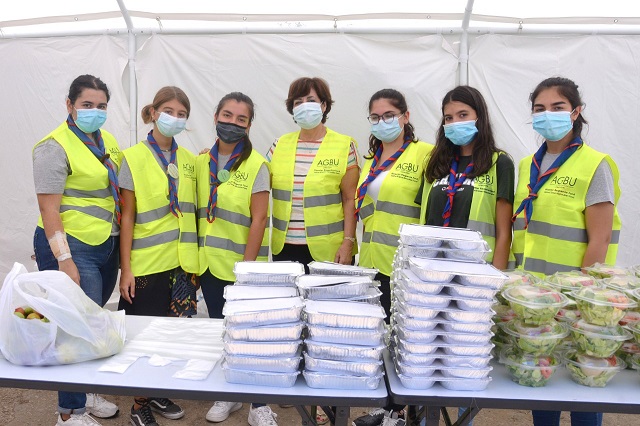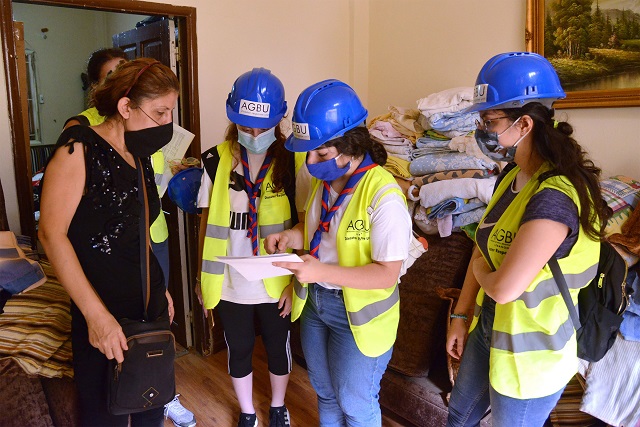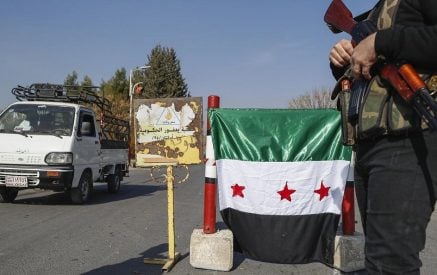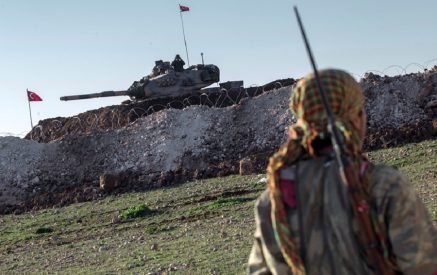AGBU enters a new and heightened phase in its 24/7 emergency humanitarian relief operations, an all-out effort quickly mobilized within hours of the blast on behalf of distressed Armenians and the community at large.
With the two million dollar mark reached within the first week, AGBU donors continued an outpouring of compassion, raising an additional one million dollars during the second week of fundraising. Among the additional lead benefactors of $100,000 or more include Nazar Nazarian and Seta Nazarian, Anne Shirinian-Orlando—designated jointly for Lebanon and Syria— as well as Levon and Vera (Anush) Nazarian, and Karnig & Ani Yacoubian. Grassroots support and contributions ranging from $10 to $1,000, $5,000 and $50,000 were received and continue to pour in, showing the extraordinary spirit of solidarity of our people.
This show of support gave AGBU Lebanon the green light to scale up its operations with the newly formed AGBU Disaster Response Unit coordinating a public help line, food distribution, shelter, home restoration, medical assistance, and newly launched mental health programs to start.
“Our community members and volunteers, most notably the AGBU-AYA scouts, jumped on the scene from day one, mobilizing clean up patrols and helping vulnerable individuals. Now with our structure in place we have damage assessment teams dispatched across four hotpot districts. Only with a true understanding of individual needs can we best execute and strategize efficient and effective relief,” reported AGBU Lebanon District member and designated head of relief operations Gary Nazarian.
Read also
With substantial damage to the AGBU Demirdjian Center, which would normally be bustling with activity on an August day, the AGBU Disaster Response Unit has set up a basecamp at the AGBU Levon G. Nazarian School complex where volunteers are showing increasing energy and resilience. “Over 300 people have passed through the doors on a rotational basis since the relief efforts began. Individuals of all ages can be found hard at work taking calls on the helpline, dispatching field work and developing ongoing and new relief programs,” stated Arine Ghazarian, Director of AGBU Lebanon and one of the key coordinators of the relief efforts.
Home visits and assessments
The main driver of short term and long term success of these efforts are the on-site visitations, conducted by well-trained volunteers, including engineers, architects, contractors and health professionals. Their work is critical in determining both the magnitude of damage and the specific need for each household. Every material loss is accounted for— from property and structural damages, utility malfunctions, and shortages of medications, food and other essentials.
Once the findings are promptly reported back to the center assessment, they are turned into action on four main fronts: food and supply distribution; damage repair and replacement; medical assistance; and temporary housing. Assignments are prioritized by need and equitably matched with action plans ranging from cleanup and ordering new appliances and furniture to hiring reconstruction crews and delivering supplies.
“Rebuilding is Phase Two of our recovery plan,” Ghazarian explains, noting that “as early as next week, contractors will go to identified locations to take measurements and prepare cost estimates. This way, resources can be allocated accordingly.”
Food, medicine and emotional support

AGBU Relief volunteers distributing hundreds of meals in partnership with international NGO World Central Kitchen and Aline Kamakian, restaurateur entrepreneur of Mayrig and Bachig.
AGBU has expanded its food distribution efforts even in these dire conditions. This week alone nearly 4,000 Armenians will benefit from 8.5 tons of grains, 1 ton of powdered milk and a variety of 10,000 cans of food. Boxes are packaged and delivered per family to last one month each.
In addition to food boxes, AGBU has partnered with international NGO World Central Kitchen run by chef and philanthropist José Andrés and AGBU alumna Aline Kamakian, founder of Mayrig restaurant and a picture of resilience herself, to prepare and distribute hot meals to those in need. Kamakian’s restaurant has been flattened and her family of employees left injured and homeless but she continues to show community service and leadership, offering her second restaurant Bachig as a one of Andrés’ initial hubs. AGBU volunteers are working at Bachig as well as distributing from the AGBU center Amanos to serve 500-1000 meals at a time.
Addressing critical medical needs, cohorts of healthcare experts are volunteering to evaluate conditions of survivors, grouping them by chronic conditions and emergency cases so treatment can be administered promptly. AGBU medical dispensaries fill prescriptions free of charge and negotiations with hotels are under way to provide a haven for those unable to return home until restoration efforts are completed.
Beginning this week, mental and emotional care will be added to the list of resources provided. With a focus on children and teens who have been undeniably affected by the immense trauma, clinical psychologists will be available for group and individual support sessions.
Filling vacuums
According to AGBU Lebanon President Gerard Tufenkjian, the severity of the man-made disaster has put extraordinary demands on the AGBU to pull all the levers at its disposal to fill the gaps left by the absent government, which resigned on August 10th.
“We know that the road to recovery will be rocky due to so many obstacles that were present in the country before the blast, but AGBU is not a stranger to calamities and it is in our DNA to be optimistic about the future. We have mustered all our energy and wits to solve problems with our practical minds and compassionate hearts.”
Tufenkjian went on to say, “By all accounts, AGBU has proven itself a trusted leader uniquely prepared and equipped to rise to the formidable challenges.”
These credits have been echoed across the Armenian and Lebanese world as beneficiaries, organizational partners, donors and the local media voice their positive impressions of the AGBU response to the multiple crises over the better part of the year and in the aftermath of the explosion.
Surely many heroes will be revealed as the AGBU footprint in Lebanon grows wider, attracting more donors, volunteers, and partnerships with global organizations seeking a reliable local agent of change to lead the way on the road to recovery.
With much more work ahead to meet the growing needs of the community, continued support of Lebanon Relief is crucial. For more information and to donate online, go to www.agbugiving.org/lebanon or contribute by phone at 212-319-6383, M-F, (9 am-5 pm EST). For wire transfer instructions to newly-designated Citibank account, write to [email protected].
The Armenian General Benevolent Union (AGBU) is the world’s largest non-profit organization devoted to upholding the Armenian heritage through educational, cultural and humanitarian programs. Each year, AGBU is committed to making a difference in the lives of 500,000 people across Armenia, Artsakh and the Armenian diaspora. Since 1906, AGBU has remained true to one overarching goal: to create a foundation for the prosperity of all Armenians. To learn more visit www.agbu.org.
AGBU Press Office
Main caption: AGBU team assesses the extensive damages to an apartment that will require costly restoration.























































